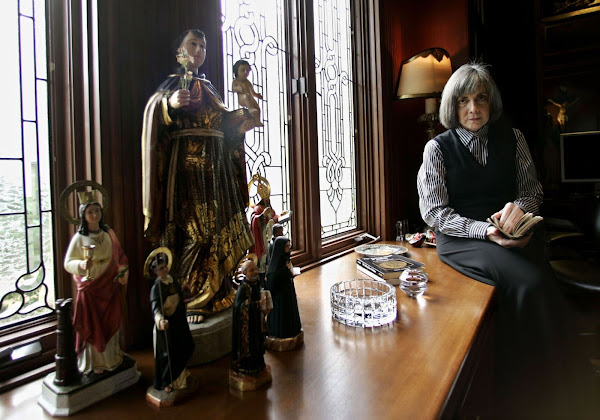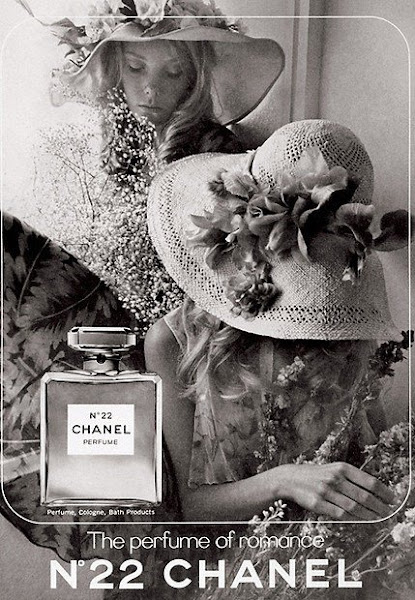"Marneffe, destroyed by the debaucheries peculiar to great capital cities, described by the Roman poets but for which our modern sense of decency has no name, had become as hideous as a wax anatomical model. But this walking specimen of disease, dressed in fine cloth, was supported on spindle-sharks clad in elegant trousers. His shriveled chest was clothed in perfumed white linen, and musk smothered the fetid odors of human decay."
The sanitation of 19th century European cities meant that scent had lost its prophylactic symbolism rampant in centuries before, when it was supposed to chase away
miasmata, according to social historian Alain Corbin, and yet the masking action of scent had not yet become obsolete, as revealed by the above passage from
Cousin Bette (La cousine Bette).
The syphilis-stricken Monsieur Marneffe, rotting from the inside out, is presented as outwardly perfectly fitting his bourgeois respectability. His presentation also belies the moral rot that mangles his heart; he pimps his wife, Valérie Marneffe, to ascend socially from clerk in the War ministry to head floor manager, and to put his plan into motion, he pimps her (or encourages her dubious dalliances) not to one but to four men at the same time.
Honoré de Balzac, that most painter-like of all social surgeon novelists this side of Charles Dickens and Jane Austen, delivers one of his most astonishing portraits of the bourgeoisie and the emergence of a novel world under the Louis Philippe reign, the July Monarchy, in
Cousin Bette. It is indeed
"one of the finest of my finest works" as the author wrote at the time in a letter addressed to his mistress Madame Henska
.
His 1846 answer to Eugène Sue's tremendous cultural imprint (
le roman feuilleton titled
Les Mystères de Paris) reprises the themes of good & evil, poor & rich, as represented by characters like the morally flawed Marneffe pair, the poor and conniving seamstress that is the eponymous "cousin Bette" (i.e. Lisbeth Fischer), the courtesans Josépha, Jenny Cadine and Carabine, the exile artist Steinbock, the struggling Hulot family and the Crevel tradesman, the latter representative of the
nouveaux riches. Balzac does so with such minutiae detail throughout, furnishing the contemporary setting of 1840s Paris, that he makes
Cousin Bette a fascinating social and economical tapestry of the era.
It is enough to consider that Louis Philippe was addressed as "King of the French", rather than as "King of France", thus signaling a break with
L'Ancien Régime and the embracing of the nascent bourgeoisie.
Perhaps of most interest to these pages is the accurate reflection of the emergence of this new stratification of society which relies on money earned in the reappearing trades of luxury after the hiatus following the 1789 Revolution; this time, not designed by minister Colbert to appeal to the aristocracy or by the Emperor Napoléon to gild his regime, but approachable to and originating from the middle classes.
Central to the plot, the Hulot family relies on previous capital acquired via Empire wages to Baron Hector Hulot, the tragic protagonist fighting with his sexual obsession, War Ministry positions won on the repute of his former glories, lawyer wages on behalf of his son Victorin, insurance policies as well as signed bills of exchange and loans. On the other hand, the equally central and plot-driving Monsieur Crevel, young Hulot's father-in-law and Hector's wife Adeline's suitor in the very opening of the novel, is a retired perfumer.
Easily the richest man in the microcosmos of
Cousin Bette, Crevel's bourgeois status is contrasted to the Hulot and even the Marneffe households, such is his relative crassness. To make a comparison, Hector Hulot makes 25,000 francs a year via his salary, and is in dire need of 200,000 francs to marry his daughter Hortense. "Respectability...begins at 50,000 francs of annual unearned income" Valerie Marneffe, an indirect
nouveau riche, declares at some point. A Parisian student would survive with the bare minimum of 1,200 francs a year. The gap with the emerging class is huge. Retired perfumer Crevel starts with 2 million francs in capital in 1838 affording him an annual income of 80,000 francs. By 1843, when Crevel marries the freshly widowed Valérie Marneffe, his fortune must have risen still, as the property he buys alone costs 3 million francs, not to mention costs of living and the riches showered for years on Madame Marneffe. Not only has his trade earned him monetary advantages beyond everyone else, he has been a deputy mayor, captain in the National Guard and Chevalier of the Legion of Honor.
It is not said what perfumes he composed and sold at
La Reine des Roses, his shop situated on the Rue Saint-Honore, the newly fashionable district of the bourgeoisie-aimed "luxury" trades (and the footing of many luxury houses to this day catering to the wealthy). The
Almanach-Bottin du Commerce cites 151 perfume houses in 1840, a mere 6 years before the writing and publication of
Cousin Bette.
Seeing as Crevel has close contact (and in fact rivals over) the courtesans du jour, like the Jewess Opera singer Josépha, the tart with a heart of gold as it transpires later in the novel, the
"number of pretty women reeking of patchouli" as Balzac puts it, gathered at her previous lodgings in the Rue Chauchet, could be wearing his products.
Josepha's new house, in the Rue de la Ville-d'-Eveque, given her by the powerful Duc d'Hérouville, merits a description worthy of the nouveaux riches in all their luxuria-showing fashion.
"Having asked for the number of the house, the Baron took a milord and alighted at one of those pretty modern houses with double doors where everything, even the gas lamps at the entrance, proclaims luxury."
But not only the courtesans profit from the aromatic and cosmetic preparations furnished by houses like that of the fictional Crevel, and the very real ones by the names of Guerlain, Houbigant , L.T. Piver, Charles Gallet, Pinaud, Raynaud and the like. Many of them had the modest beginnings of Crevel; Antonin Raynaud, the son of a butcher in Grasse, became a partner in the Legrand perfumery and took over a short 3 years later. Most gained similar advantages thanks to their social status afforded them by their trade. Alphonse-Honoré Piver was knighted in 1867 and became an officer in 1878, Aimé Guerlain was knighted in 1892.
[1] These perfumers promoted their names as brands, enhancing the value of their wares, taking advantage of their enhanced social standing and thus placing a symbolic value on their products; the modern definition of luxury.
Lisbeth (Bette) Fischer is transformed from ugly and insignificant, bitter spinster by her ally in evil, madame Marneffe, via the synergy of what the luxury trades of mid-19th century Paris could afford her. In fact the broadening of perfume's and other luxurious products "social diffusion invites questions about perfume's identification at that time as a luxury product"
[2].
"A revolutionary change had taken place in Cousin Bette. Valérie, who had insisted on choosing the old maid's clothes, had profited greatly from it.
This strange woman, her slender figure now properly corseted, used bandoline lotion for her well-smoothed hair, accepted her dresses as the dressmaker delivered them, and wore elegant little boots and grey silk stockings which were, moreover, included in the tradesmen's bills to Valerie and paid for by whoever was entitled to settle them."
The role of added wiles reprises erotic quota in the hands of the duplicitous Valérie Marneffe.
"Out of the corner of her eye and in the mirror, she had been watching the expression on Monte's face; she thought that in his pallor she saw signs of the weakness which makes such strong men captive to the fascination of women. She took him by the hand, going so close to him that he could smell those powerful, beloved perfumes that intoxicate men in love. And feeling his heart beat faster, she looked at him reproachfully."
Valérie Marneffe, the married woman who destroys the Hulot family with her "kept woman" ways, exchanging favors of a sexual nature for increasing sums of money, effectively bleeding Hector Hulot dry, has only ever been enticed sentimentally by the Brazilian Baron Montès who will ultimately prove her nemesis. And yet, when caught in an illicit and shameful tryst by him with another young man not her husband, she uses her courtesan wiles to gain footing into Montès's heart again. Such is her erotic power and the outward respectability of "the bourgeois married woman" that she seems to gain momentum for a while. Like the French author mentions elsewhere:
"Hortense was a lovely morsel of flesh, as Valerie said to Lisbeth, but Madame Marneffe had a spirited demeanor and the piquancy of vice. Devotion like Hortense's is a feeling that a husband thinks is his due. [...] A disdainful woman, above all a dangerous woman, stimulates curiosity, as spices enhance the flavor of good food."
The relative anonymity with which the perfumes and other luxury products are recycled in
Cousin Bette are completely integrated into the budding shift happening in the market. The differentiation of products once sold as commodities and slowly turned into "brands" in the 1860s ~and more markedly in the 1880s and 1890s thanks to the mechanization and the introduction of synthetic compounds~ shifted the artisanal value of the raw materials into a symbolic value placed on a product whose production cost had significantly decreased.
Contrary to the art world, in which the destruction of all molds and models for the statuettes, figures and sculptures meant the uniqueness and originality of the purchased goods, "the last word in modern luxury" as Balzac mentions, the world of cosmetic preparations and perfumes has been irrevocably democratized. The next major step in this course will happen in the beginning of the 20th century with François Coty.
[1] [2] Business History Review 85 (summer 2011), Eugenie Briot. Harvard College ISSN 0007-6805; 2044-768X (web)
.jpg)

















.jpg)


.jpg)